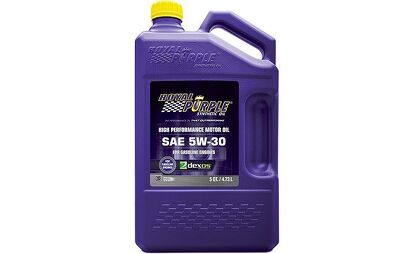The Best Synthetic Oil To Keep Your Engine Healthy
Editor’s Note: We have seen repeated and severe shortages of synthetic motor oil in 2021 and 2022, and the U.S. Energy Information Administration’s monthly data continues to show a downward trend in production. We’ll try to keep our list current, but if you see your favorite brand in stock, it’s a good time to stock up.
When it comes to the topic of synthetic oils for your vehicle, you’ll likely hear plenty of opinions that are divisive when it comes to their advantages compared to conventional oils. Some automotive enthusiasts will argue that conventional oil performs the same as synthetic oil, adding that synthetic oil is simply marketing. Generally speaking however, synthetic oil does offer many benefits compared to conventional oil, it’s just a matter of whether or not your vehicle will take advantage of those benefits on a daily basis.
If you’re reading this page, you’ve likely decided that you want to purchase synthetic oil for your vehicle and are looking for the best options. Truth be told, you’ll find that many of the products in today’s marketplace perform similarly and you could make a case that it does all come down to marketing. At the end of the day, it’s difficult for most vehicle owners to tell the difference between different brands of oil, unless they’re monitoring numerous aspects about their vehicle and changing their oil on their own at regular intervals.
Before we get into any of the real nitty gritty, there’s one thing to get out of the way. Whatever oil viscosity your car runs, stick with it. If your owner’s manual says 5W30, or 15W40, or 10W60 as an oil viscosity grade, that’s what you’re looking for in your new oil regardless of what brand name is on the bottle.
Knowing that, it’s not surprising that the majority of products you find will have an overwhelming number of positive reviews. For most drivers, any particular oil is doing its job so long as the engine runs and isn’t falling apart. Generally, most companies will advertise the same properties for their synthetic oil offerings, but there are some defining features for each product, which we’ll go into detail below.
If you’re searching for more information about synthetic oil products, refer to our table of contents, where we go more in depth about what makes synthetic oil different than conventional oil, and the benefits you can expect for paying the higher price.
Table of contents
- 1. Editor's Pick: Royal Purple High Performance Synthetic Oil
- Promoted Product: ENEOS 0W-20
- 2. Best for Diesel Engines: Shell RotellaT6 Full Synthetic Diesel Oil
- 3. Mobil 1 Extended Performance Synthetic Motor Oil
- 4. Pennzoil Platinum Full Synthetic Motor Oil
- 5. Mobil 1 High Mileage Full Synthetic Motor Oil
- 6. Castrol GTX Magnatec Full Synthetic Oil
- 7. Liqui Moly Premium Synthetic Motor Oil
- 8. Valvoline Advanced Full Synthetic Motor Oil
- 9. Castrol Edge Advanced Full Synthetic Motor Oil
- 10. Valvoline High Mileage with MaxLife Technology Synthetic Blend Motor Oil
- Everything You Need to Know About Synthetic Oil
- What is Motor Oil?
- Petroleum Motor Oil
- Synthetic Oil
- Semi-Synthetic Oil
- Your Correct Synthetic Oil Change Interval
- Mobil 1
- ELF
- Royal Purple
- Synthetic Oil Tips
- Is Synthetic Oil Better for Your Car?
- Synthetic Oil vs Regular Oil - Technical Characteristics
- Oil Viscosity
- Viscosity Index
- Pour Point
- Total Base Number (TBN)
- Benefits of Synthetic Motor Oils
- Longer engine life
- Fewer oil changes
- Improved power and fuel economy
- Improved extreme temperature protection
- Synthetic Oil Safeguards Essential Turbocharger Parts
- You Still Need to Regularly Change Synthetic Oil
- So, Should I Use Synthetic Oil?
- Recent Updates:
- Q & A
1. Editor's Pick: Royal Purple High Performance Synthetic Oil
Many of the brands on this list are well known and trusted among automotive enthusiasts, but Royal Purple also has a great reputation with high-performance vehicle owners. The company’s API-licensed oils carry the current API and ILSAC engine oil licenses, along with the GM dexos1 gasoline engine oil approval. Royal Purple’s Synthetic Oil features enhanced additive technology that helps to prevent metal-to-metal contact beyond both GM dexos1 and ILSAC GF-5 specs, while providing better fuel economy and better protection for vehicle exhaust emissions equipment. This product also features patented anti-wear additive chemistry, which minimizes the harmful effects exhaust gases pose to the catalyst.
If you’re running fuel with ethanol, this oil should be towards the top of your list since it also has patented additive technology that prevents the white sludge and lubrication starvation that can occur with higher concentration gasoline-ethanol blends.
It is more expensive than other products on our list, but it’s one of the most popular and highly rated synthetic oils available.
Pros | Offers better wear protection, increased fuel efficiency, protects catalytic emission system, improves compatibility with ethanol, corrosion protection, meets ILSAC GF-5 and dexos1 requirements |
Cons | Price, not necessary for most daily drivers, limited viscosity choices |
Promoted Product: ENEOS 0W-20 Fully Synthetic Motor Oil
Many of the top import brand automobiles suggest running 0W-20 weight oil during the warmer months for superior fuel economy. If you are looking for the oil brand that was developed alongside the same motor for this exact purpose, look no further than ENEOS 0W-20 Fully Synthetic Motor Oil. This 0W-20 synthetic oil blend comes from a specific combination of high-performance hydro-refined base oils and an optimized additive blend to provide better fuel economy, and increased emission system durability.
Since it was first founded in 1888, ENEOS has long partnered with Japanese auto manufacturers, with in-house testing facilities within these manufacturers where specific oil blends are created to meet the exact vehicle and performance specifications. The 0W-20 blend provides excellent fuel economy and environmental protection, and is completely compatible with hybrids and LEVs. This oil meets API SP and ILSAC GF-6A standards, and is dexos1 Gen3 approved, providing broad compatibility with domestic and import vehicles, making it perfect for whatever brand of vehicle you drive.
Pros | Engineered alongside the vehicle’s engines for optimal compatibility, protection and performance; Improved fuel economy; Outstanding thermal protection and clarity |
Cons | Harder to locate (but they are working on it) |
2. Best for Diesel Engines: Shell RotellaT6 Full Synthetic Diesel Oil
If you have a diesel engine and want a synthetic oil option, look no further than Shell’s Rotella. Compared to a conventional 15W-30, this product can improve fuel economy by up to 2.8%, while its Triple Protection Plus formula combines fully synthetic base oils with advanced additives to deliver equipment protection and long engine life. This synthetic oil is also formulated with additive technology to protect against the effects of soot, dirt, and other contaminants.
Shell says Rotella T6 is engineered with shear stability to resist viscosity loss, while helping maintain optimal oil pressure. This product is suitable for diesel-powered vehicles, especially in northern climates, including commercial trucks and heavy-duty pickup trucks that allow an SAE 5W-30 oil.
It carries a long list of specifications, approvals, and recommendations, including
- API: CK-4, CJ-4, CI-4 PLUS, CI-4, CH-4; ACEA E9; Allison TES 439; Caterpillar ECF-2/ECF-3; Cummins CES 20086, 20081; Detroit Fluid Specification (DFS) 93K222, 93K218; Ford WSS-M2C171-F1; JASO DH-2; JASO MA/MA2; MAN M3575; MB-Approval 228.31; and Volvo VDS-4.5, 4.
Pros | Improves fuel economy, formulated with addictive technology to protect against soot, dirt, and other contaminants, engineered with shear stability, overwhelming positive reviews |
Cons | Only certified for diesel engines |
3. Mobil 1 Extended Performance Synthetic Motor Oil
Featuring an advanced full synthetic formula, Mobil 1’s Extended Performance Synthetic Oil is designed to help prevent deposits and sludge build up for longer engine life while helping maintain stable oil viscosity. This oil will provide excellent overall lubrication and wear protection under various operating conditions thanks to a precise balance of performance additives. It also boasts great thermal and oxidation stability and exceptional control of oil breakdown.
With excellent low-temperature capabilities, this oil will help your engine start quicker in the cold for faster protection and extended engine life.
Pros | Extremely popular and reputable brand, helps prevent deposits and sludge buildup, get overall lubrication and wear protection performance, exceptional control of oil breakdown, excellent low temperature capabilities |
Cons | Price varies, some owners complain this oil made their engines noisier |
4. Pennzoil Platinum Full Synthetic Motor Oil
Pennzoil Platinum Full Synthetic Motor Oil has been engineered using the company’s PurePlus gas-to-liquid technology, a patented process that converts pure natural gas into a high quality, full synthetic base oil. Pennzoil claims its base oil is 99.5% pure, which means it contains fewer impurities than base oils made from crude oil. Combined with a high performance additive system, using this oil could net you as much as 550 miles extra per year in terms of fuel economy, when compared to a dirty engine.
It’s also great for modern turbocharged engines, by offering protection against the effects of low speed pre-ignition (LSPI). Pennzoil also says its synthetic oil flows faster in cold extreme temperatures, which means your engine parts get quickly lubricated during a cold start. In extreme hot temperatures, this oil has a lower tendency to evaporate.
Pennzoil’s synthetic oil also keeps pistons up to 50% cleaner than required by Sequence IIIH results, one of the toughest industry standards.
Specifications, approvals, and recommendations include FCA MS-6395, Chrysler MS-13340, Ford WSS-M2C946-B1, GM dexos1 Gen 2, Honda/Acura HTO-06, and Volvo. This product exceeds the requirements of API SN PLUS, API SN-RC, and all previous categories; ILSAC GF-5; and ACEA A1/B1.
Pros | Fully synthetic oil, improves fuel economy, helps protect engines from horsepower loss, great performance in extreme temperatures, provides wear protection from friction and oxidation stability |
Cons | Most users have complaints about the packaging and rebate, small number of reports that fuel economy improvement isn't as great as other products |
5. Mobil 1 High Mileage Full Synthetic Motor Oil
For high mileage protection, Mobil 1 offers a full synthetic oil for engines with over 75,000 miles. Boasting excellent overall lubrication and wear protection, this product is designed to outperform Mobil 1’s conventional high mileage oils. Look for this oil to help protect critical engine parts in higher mileage engines, while reducing the sludge and deposits that conventional oils can leave behind. Its formula also helps prevent leaks, which could naturally occur on older engines.
Mobil 1 says this oil uses a proprietary blend of high performance synthetic base oils to deliver up to 500,000 miles of proven protection. It also features a boosted level of seal conditioner to protect engine seals, since over time, rubber seals can harden or shrink which causes oil leaks.
Depending on the viscosity, this oil meets or exceeds the requirements of API SN Plus, SN, SM, and SL. Some grades also meet or exceeds ACEA A1/B1, A3/B3, and A5/B5.
Pros | Overwhelming positive reviews, designed for high mileage engines, helps protect critical engine parts, reduces sludge and deposits conventional oils can leave behind, helps prevent leaks |
Cons | Price fluctuates/varies, limited viscosity options |
6. Castrol GTX Magnatec Full Synthetic Oil
Looking to dramatically reduce engine wear? Castrol’s GTX Magnatec Full Synthetic Oil promises to leave engine parts up to 4 times smoother. What makes this oil different is that it’s specially formulated with intelligent molecules that cling to the engine during all sorts of driving conditions, even when the engine is off. Typically, once an engine stops, the oil drains back to the sump—but not with Castrol GTX Magnatec Instead, the intelligent molecules won’t drain down, clinging to critical engine parts like a magnet.
This helps protect your engine since 75% of engine wear occurs during the warm up process. Since oil drains down on most engines once they’re shut off, it takes a bit of time for everything to recirculate and lubricate once you turn on the engine. This oil helps prevent that from occurring, resulting in less engine wear over time.
This product is available in 0W-20, 5W-20, 5W-30, and 10W-30. Performance claims depend on the viscosity, but at the minimum, it meets API SN and ILSAC GF-5 requirements. The other variants cover API SN Plus, GM dexos1 Gen 2, and a couple Ford certifications.
Pros | Helps reduce engine wear, leaves critical engine parts smoother, adds a layer of protection for warm up and driving, meets several standards (API SN, ILSAC GF-5, GM dexos1, etc) |
Cons | Some owners report oil leaks from the cap if the bottle is stored or falls to the side, limited viscosity options |
7. Liqui Moly Premium Synthetic Motor Oil
Made in Germany, Liqui Moly Synthoil Premium is a favorite among European car owners. Offering high level of protection against engine wear, this synthetic oil aims to deliver long service life for your engine by rapidly delivering oil at low temperatures. It also boasts very high lubrication reliability at high and low temperatures, resulting in outstanding engine cleanliness.
Approvals for the Liqui Moly Synthoil Premium include ACEA A3 and B4, API CF and SN. This product is especially recommended for vehicles that need to comply to BMW Longlife-98, MB 229.3, Porsche A40, VW 502 00, and VW 505 00 specifications.
This fully synthetic oil works on both gasoline and diesel engines.
Pros | Designed for rapid oil delivery at low temperatures, very high lubrication at high and low temperatures, high level of protection against wear, keeps your engine clean |
Cons | Cap is tricky to open, easy to spill while pouring, this oil is geared towards European vehicles, limited viscosity grades |
8. Valvoline Advanced Full Synthetic Motor Oil
Another popular brand is Valvoline, which actually offers a few types of full synthetic oils. From the SynPower lineup, this product promotes engine cleanliness through superior sludge and varnish protection. It offers outstanding high temperature protection under severe driving conditions, as well as superior cold temperature protection thanks to faster oil flow during engine startup.
Designed to fight the three major causes of engine stress—heat, deposits, and wear—Valvoline’s SynPower features durable anti-wear additives that stay in the oil longer. The 0W-20, 5W-20, and 5W-30 viscosity grades all meet or exceed the requirements of GM dexos1 Gen 2. That means this oil meets the performance requirements of virtually all naturally aspirated, turbocharged, and supercharged vehicles operating in North America.
Pros | Offers great sludge and varnish protection, high- and cold- temperature protection, helps maintain fuel efficiency, meets performance requirements of virtually all vehicles sold in North America |
Cons | Jug is awkward to pour, some users suspect this oil uses conventional blends |
9. Castrol Edge Advanced Full Synthetic Motor Oil
Boasting Fluid Titanium Technology, Castrol Edge Advanced Synthetic Oil is the choice for owners who are looking for maximum performance and protection for their vehicles. The Fluid Titanium Technology claims to help the oil transform its structure under pressure in order to keep metal apart, while reducing friction for maximum engine performance.
Castrol Edge improves oil film strength by 30% and reduces friction, which can rob your engine of horsepower. It’s 10 times stronger against high temperature oil thickening and is 6 times stronger against wear compared to the industry benchmark. The 0W grades will also improve your fuel economy.
Depending on the viscosity, this oil meets or exceeds a wide range of industry standards including API SN and SN Plus, ILSAC GF-5, ACEA A1/B1, and GM dexos1 Gen 2.
Pros | Designed to offer strength under pressure, reduces metal-to-metal contact, decreases engine deposit formation, meets various standards (API SN, ILSAF GF-5, GM dexos1, etc) |
Cons | Seal on the bottle is questionable—some users report it leaks, some users report the oil turns black quicker than some competitors |
10. Valvoline High Mileage with MaxLife Technology Synthetic Blend Motor Oil
Valvoline also offers a High Mileage Synthetic Oil, featuring seal conditioners that rejuvenate aging engine seals. These conditioners help stop and prevent oil leaks, which is common in high mileage engines. In addition, it offers extra wear protection and detergents to keep older engines cleaner by bonding with and removing sludge and deposits. Anti-oxidants also play a role by preventing oil breakdown, which helps stop engine-clogging sludge and deposit formation.
The advanced formulation also supplies proven wear protection additives that hold up to high temperatures and friction under the most severe driving conditions. The 0W-20, 5W-20, and 5W-30 viscosity grades meet or exceed the requirements of GM dexos1 Gen 2.
Pros | Features seal conditioners that rejuvenate aging engine seals, extra wear protection, detergents designed to keep older engines cleaner, prevents engine sludge and deposit formulation |
Cons | Some users report jug/cap leaks |
Everything You Need to Know About Synthetic Oil
Photo Credit: Africa Studio via Shutterstock
There are several routine maintenance items you need to stay on top of to keep your engine running in optimal condition, and changing your oil really is paramount. It’s also something you could do yourself if you’re comfortable, along with using fuel injector cleaners to ensure your engine is running efficiently and smoothly.
Motor oil may seem to be a simple and mundane product, but it actually plays a major role in how your engine performs, and how long it ultimately last without eating itself alive. In the simplest sense, oil lubricates all the moving parts in your engine and works to prevent unwanted metal-on-metal contact between those components. So long as your engine stays properly lubricated, the less wear will occur between these metal components, and the fewer problems you’ll deal with over the life of your vehicle. Below, we’ll get into the nitty gritty details about motor oil.
What is Motor Oil?
Motor oil carries two basic ingredients: base oils and additives. The base oils constitute the lion’s share of the oil (a ballpark of 70-90%). Base oil can be composed of the below:
Petroleum (conventional oil)
Chemically Synthesized Components (synthetic oil)
A blend of petroleum and synthetics (known as semi-synthetic)
Additives take up the remaining percentage of volumes, and this is the area where different motor oil brands are able to fine tune their oils towards specific benefits that they want to achieve—better heat stability, increased capture of oil particulate, and a host of other items. Additives often include:
Detergents
Friction modifiers
Corrosion inhibitors
Anti-foaming additives
Petroleum Motor Oil
The conventional petroleum motor oil is the stuff that’s been around forever now, and is basically comprised of decomposed dinosaurs—ok not exactly. The oil possesses hydrocarbon molecules of varying lengths, with some being light liquids while others are heavy. This is in part what leads to engine oil’s tendency to thicken when cold, and thicken when hot. In older higher-wear engines, you can sometimes notice this directly, as engines will occasionally be more noisy/emit more clattering noise from the top end (often lifters and associated linkage).
There are also residual molecular components in conventional engine oil that encourage sludge formation in engines. The additive packs in conventional oil are designed to limit this to the best of their ability, but they can only do so much. This is precisely why oil changes for cars on conventional oil need to happen more frequently than for cars running synthetic.
Synthetic Oil
Synthetic oil has significantly more uniform properties than traditional mineral lubricating oils. Manufactured from base oil stocks, its hydrocarbon molecules are evenly sized, and it contains far fewer of the impurities and residual compounds that lead to the sludge buildup of conventional oil. The uniformity of synthetic oil substantially contributes to its improved performance, particularly during low and high temperatures.
Synthetic oil was first created in the late 1930s for use in aircraft engines during the Second World War (on both sides). Using a blend of poly (ethylene) oil with adipic acid ester, the more stable and longer lasting oil proved perfectly suited for wartime service, as planes were frequently being run hard, and needed to be ready to take off at a moment’s notice. It made a significant difference when getting these old rotary engines to fire up in cold weather, and helped keep oil coolers from gunking up and suffering from blockages.
After the war, the invention of the jet engine paved the way for the first wide-scale usage of synthetic motor oils outside of wartime, as its high operating temperatures were too severe for conventional motor oil to handle. In 1975, the first commercially launched synthetic motor oil saw the light of the day.
Semi-Synthetic Oil
This one is as simple as it sounds. Semi-synthetic oil is a blend of mineral and synthetic oil. The ratio of the mixture typically ranges between 35/65 and 25/75 of mineral and synthetic oil respectively. It is definitely better than regular motor oil but is still inferior to going full synthetic.
These oils are not processed to function in searing temperatures but still come with the capacity to combat hot-cold variations much better than conventional petroleum oils, making them ideal for motorists living in moderate conditions. Nonetheless, extended usage of semi-synthetic oils can cause sludge formation to settle down in engines, and other than a slight difference in cost, it generally makes sense to switch to full synthetic to gain the full benefit if you’ve previously been running a semi-synthetic oil.
Your Correct Synthetic Oil Change Interval
A popular suggestion by service stations and mechanics is to change the motor oil every 3,000 miles in the case of conventional engine oil, and maybe double that for synthetic. With conventional oil the 3,000-mile suggestion isn’t terrible if you’re a more aggressive driver and tend to make more thorough use of your car’s engine rev range. If you spend your days at a gentle cruise through traffic, these low intervals are likely overkill. That said, here’s what most of the oil manufacturers have to say on the topic.
Mobil 1
The globally renowned brand recommends synthetic oil change intervals up to 15,000 miles or 12 months, whichever comes first.
ELF
Your conventional oil will give you 5,000 miles, while the synthetic variety will render 7,500 to 10,000 miles.
Royal Purple
Similar to Mobil 1, Royal Purple synthetic oil can run 12,000 miles as the admissible oil change interval. What’s more, the company’s HPS synthetic performance upgrade oil allows up to 15,000 miles in between car oil changes.
Synthetic Oil Tips
Do not assume the most expensive synthetic oil is the best option for your engine. It’s important to stick to the specification and oil grade recommended by your auto manufacturer. Also, make sure to pick the right engine oil for your mileage—older engines have different needs, and certain engine oils are geared towards higher milage engines.
ALWAYS CHANGE THE FILTER. Changing your engine oil and not the filter is like having a shower and then putting back on dirty underwear. Anyone who tells you otherwise doesn’t know what they’re talking about.
Swapping from conventional motor oil to synthetics is not risk-free depending on the age of your engine. Because synthetic oil is more stable regardless of temperature, it will be “thinner” when your car is at rest. If certain gaskets within your engine were already starting to fail, having thinner oil will mean that leaks may become more apparent more rapidly. The oil itself won’t cause the leak, but leaks that were coming your way anyway might make an early appearance.
Know what your oil warning lights mean. A red lit warning with the engine means you have a serious issue and should not drive. At times a yellow oil warning light can appear to indicate either a low oil level, or that you are due for an oil change. This does not need to halt your journey, but it does mean you should deal with it sooner rather than later.
Make a habit of regularly checking your engine oil level. You can do it once a month for newer models, and weekly for older and high mileage cars. If your car has a dipstick under the hood, make the check with the engine off. If your car has an electronic measurement that displays in the instrument cluster, the car can be running for that check.
Is Synthetic Oil Better for Your Car?
Photo Credit: RobertZac via Shutterstock
There has been a lot of debate over the whole conventional vs. synthetic oil situation over the years. In general, synthetic oil is more expensive up front, but less so when you consider its longer lifespan. The real question is, is synthetic oil better for your car? We break it down below.
Synthetic Oil vs Regular Oil - Technical Characteristics
There are many characteristics of oil that indicate its quality and effectiveness. These include:
Oil Viscosity
It is the most critical characteristic and is a yardstick of the oil’s thickness at different temperatures. Therefore, high viscosity oils are denser than low viscosity motor oils. However, modern oils are typically multi-grade oils, which stay thin enough to lube engines even at sub-zero temperatures. Nonetheless, it’s important to consult the car’s user manual to purchase the manufacturer-recommended grade of oil.
Viscosity Index
Motor oil gets thicker upon getting cold, and thins when the temperature is hot. The viscosity index is a measurement of the alteration in oil adhesiveness between 100 and 210 Fahrenheit. Oil with a soaring viscosity index offers less change in viscosity than any oil with a low viscosity index.
Group I & II mineral motor oils come with a viscosity index under 120 and require viscosity improvers to lift their viscosity to functional levels. Alternatively, the best synthetic oils have viscosity indexes reaching 180 without requiring any additives.
Pour Point
Pour Point is the lowest temperature at which motor oil can be poured out of a container. It is a practical measure of the oil’s appropriateness for chilly weather, and synthetic oils approach much lower pour points than regular oils.
Total Base Number (TBN)
Total base number (TBN) measures the capacity of the motor oil to absorb engine generated acid. Therefore, the bigger the number, the longer motor oil will last. Also, higher TBN motor oils can neutralize a substantial amount of combustion by-products and acidic materials, which results in strengthened protection against corrosive reactions.
Top synthetic oils consistently demonstrate high TBNs, thereby offering much more car security compared to regular vehicle oil.
Benefits of Synthetic Motor Oils
Longer engine life
The enhanced lubrication properties of synthetic oil have shown proven results in extending engine life. A number of oil companies have engaged in torture testing in varying ways, including Mobil 1, who put a 1990 BMW 325i on a rolling road for 4 years and 1,000,000 miles (with scheduled oil changes and other fluid maintenance), to prove its oil’s efficacy. A 1M mile teardown proved all of the Bimmer’s engine internals remained within factory specifications.
Fewer oil changes
Engines functioning on synthetic oil call for fewer oil changes. In fact, few European auto manufacturers recommend oil change intervals after 18,000 miles, if your car engine is using synthetic oil. In addition, synthetic oil doesn’t break down, oxidize, or allow sludge-formation as quickly as regular oils.
Improved power and fuel economy
The lower friction characteristics of synthetic vehicle oils mean that engine power and fuel economy are improved—though nominally, for the record.
Improved extreme temperature protection
Synthetic oils are ultra-resistant to disintegration in high temperatures, making them especially advantageous for turbocharged engines.
Synthetic Oil Safeguards Essential Turbocharger Parts
To fulfill consumer demand, automakers are now manufacturing vehicles with smaller engines to obtain greater fuel efficiency. However, some of these engines also benefit from forced induction, such as adding a turbocharger, to boost power. As we mentioned before, engines running at high temperatures break down regular motor oils quickly, and modern turbocharged engines are inherently more aggressive, putting more demands on your engine’s oil supply.
Remember, the shaft within a turbocharger can spin 200,000+ RPM (revolutions per minute), which makes it critical for the motor oil to very quickly get to the shaft and properly lubricate it. Regular vehicle oil will break down swiftly under these conditions, leaving deposits on the components and increasing the chance of a failure.
In addition, synthetic oils are engineered to shield these components a lot better than regular oils, which ensures that your engine is functioning at peak performance with sustained power.
You Still Need to Regularly Change Synthetic Oil
Yes, synthetic oil is excellent, but that doesn’t mean it will last forever. Of course, the base lubricant is fantastic, but the additives that form about 25% of the product volume can still get exhausted. Therefore, unburned fuel, partly burned hydrocarbons, metal wear particles, carbon particles, and atmospheric dirt shall build up just as quickly in a synthetically lubricated engine as in a petroleum-based oil.
The only way to prevent this situation is to drain and replace the motor oil (and its filter) regularly. As we noted further up, There isn’t a hard & fast rule for intervals, though between your local mechanic, the oil companies, and the manufacturer that built your car in the first place, we would follow the manufacturer intervals with the exception of vintage and older “beater” cars.
So, Should I Use Synthetic Oil?
In short, yes, you should probably be using synthetic oil if you can afford it. There are just so many benefits to using synthetic oil. Just keep in mind our warning about leaks if you’re converting from conventional to synthetic.
Some high-end and high-performance cars are offered factory filled with synthetic oil, and it would be wise to keep doing so to optimize performance and protect that precious engine. If you live in a region that gets extremely frigid in the winter, you’ll be better off with fully synthetic oil due to its premium cold-weather starting. The same goes for very hot weather—if you get hot summers, synthetic oil will help keep your car’s engine running smoothly.
Also, if you regularly tow a trailer, you should use synthetic oil along with installing an auxiliary oil cooler.
Remember, synthetic motor oil costs more money up front, but can also save you money over time by protecting your engine longer.
Recent Updates:
January 28, 2022: Updated description and link for Shell Rotella T6.
January 7, 2022: Added Editor's Note.
December 22, 2021: Updated description and link for Shell Rotella T6. Updated FAQs.
December 3, 2021: Updated outdated product links.
We are committed to finding, researching, and recommending the best products. We earn commissions from purchases you make using the retail links in our product reviews. Learn more about how this works.
Q & A
What's So Fantastic About Synthetic Oil?
As you may know by now, all motor oils are composed of base oils and additives. Synthetic lube possesses more finely refined base oils than traditional mineral oils, offering you premium performance and protection. Moreover, synthetic car oils extend a host of benefits that keep the engine running at optimized performance for many years, such as preventing wear, keeping the engine clean, flowability, maintained viscosity, rust-resistance, and reduced friction.
What is Engine Oil Viscosity?
The big numbers on a motor oil bottle such as 10w40 or 5W30 indicate its viscosity, which you can say is the oil’s thickness. In simple terms, thin oil comes with low viscosity, and thick motor oil has high viscosity. When the climate is cold, motor oil should flow slowly, and when it is hot, the oil will flow faster. However, to properly lubricate an engine, the oil has to flow at a uniform rate through a wide spectrum of temperatures. If you live in Siberia and it’s freezing cold outside, the engine oil needs to be thin enough to lubricate all the essential internal components the moment you turn the key. Likewise, if you’re driving in the heavy Dubai traffic, and you feel like you’re melting, the engine oil should stay gummy enough to appropriately lubricate.
Changing The Oil Filter
The majority of auto professionals will recommend changing the oil filter whenever your change the motor oil. Therefore, it’s important to use an oil filter, which renders protection for your car’s supposed oil change interval. All the top synthetic motor oils reviewed in this guide work well with top-rated oil filters available in the market.
Why Switch From Regular to Synthetic Oil?
You will make the switch if you care about your engine’s health. Simply put, 80% of the motor oil is made of base oils, while additives complete the remaining 20%. The chemically processed molecules in synthetic base oil possess more uniform properties compared to the conventional base oil, which differs in level and shape of impurity. Lastly, 70% of latest car models in 2018 use synthetic vehicle oil to sustain engine performance.
Can I Mix Different Synthetic Oils Together?
Yes, you can make a blend of different vehicle oils. Any renowned synthetic motor oil is completely compatible with traditional mineral oils, semi-synthetic oils, and other synthetic blends. However, it is critical to remember that the premium performance of any high-quality synthetic oil will be marginally compromised by diluting it in any way.
What Differentiates Fully Synthetic Oil From A Semi-Synthetic Motor oil?
All engine oils are composed of base oils and additives. Fully synthetic engine oil carries 100% non-traditional, premium-performance fluids. Conversely, semi-synthetic engine oils or blends possess only a fraction amount of these premium-performance fluids compared to any top synthetic oil brand.
What’s The Role of an Additive?
The majority of lubricating motor oils have other chemical additives added to bolster the overall fluid performance. These additives assist lubricants to withstand extreme operating environments. As per auto experts, even the most splendid base oil cannot protect on its own against shearing forces, chemical, water dilution, wear particles, and corrosion. In short, additives give good base oils the performance benefits such as prolonged drain intervals, multi-grade performance, and intense-pressure performance.
Cars, Motorcycles, ATVs, Watches-if it has gears somewhere in its inner workings, there's a good chance he has an interest in it. As Gear Editor, Justin leverages his technical background as an automotive technician and his dozen years of experience as a journalist to break down products, parts, accessories, tools, and other items in a manner more suited to a broader audience. He's also tasked with sniffing out deals and promotions in these same categories.
More by Justin Mastine-Frost













































Comments
Join the conversation